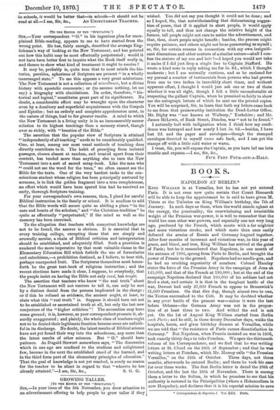MD THE EDITOR OF THE "SPECTATOR."]
SIR,—Your correspondent " O." in his ingenious plea for unex- plained Bible-reading, appears to me to have started from the wrong point. He has, fairly enough, described the average Eng- lishman's way of looking at the New Testament, and has pointed -out how this habit may be most effectually perpetuated ; would it not have been better first to inquire what the Book itself really is, and thence to show what kind of treatment it ought to receive ?
It may be, probably is, quite true that to most minds the his- tories, parables, aphorisms of Scripture are present " in a wholly smarranged state." To me this appears a very great misfortune. The New Testament is not a collection of miscellanea, but a divine thistory with apostolic comments ; or (to assume nothing, let me say) a biography with elucidations. Its order, therefore, " his- torical and logical," constitutes great part of its significance. No -doubt, a considerable effect may be wrought upon the character -even by a desultory and superficial acquaintance with the Gospels and Epistles ; but an orderly and complete apprehension must, in the nature of things, lead to far greater results. A mind to which the New Testament is a living unity is in an immeasurably nearer relation to its highest teachings than a memory stored, though --ever so richly, with "beauties of the Bible."
The assertion that the popular view of Scripture is attained 44 independently of all teaching " needs to be considerably qualified. Cone, at least, among our most usual methods of teaching does
• directly contribute to it. The habit of preaching from isolated gpassages, chosen almost at random, and treated apart from their -context, has tended more than anything else to turn the New 'Testament into a sort of sacred scrap-book. Like the man who -" could not see the wood for the trees," we often cannot see the Bible for the texts. One of the very hardest tasks to the con- =scientious student whose religion has been principally nurtured by sermons, is to link the golden fragment into a true completeness, an effort which would have been spared him had he received an early, thorough Scripture training.
For your correspondent's own reasons, then, I plead for careful Biblical instruction in the family or school. It is needless to add that the Bible words will secure quite as abiding a place " in the -ears and hearts of the scholars," and "the Christian tradition" be quite as effectually "perpetuated," if the mind as well as the memory has been exercised.
To the allegation that teachers with competent knowledge are mot to be found, the answer is obvious. It is essential that in -every training college, excepting those that are simply and -avowedly secular, a chain of Biblical criticism and interpretation ,should be established, and adequately filled. Such a provision is -rendered the more imperative by that most valuable clause in the Elementary Education Bill which forbids the use of formularies and catechisms,—a prohibition destined, as I believe, to bear rich, perhaps unexpected fruit. The Scriptures themselves must hence- forth be the great text-book of religions instruction ; and the recent elections have made it clear, I suppose, to everybody, that the people insist on having the Bible not only read, but taught.
The assertion that teachers who know " the real truth" about the New Testament will not venture to tell it, can only be met by a distinct denial from the persons implicated in the charge ; -or if this be refused as evidence, the accuser ought, at least, to state what this " real truth " is. Suppose it should turn out not to be established or ascertained truth at all, but only the last new -conjecture of the " higher criticism" ! The accusation may have -some ground; it is, however, as your correspondent presents it, ab- surdly exaggerated ; and plainly, the whole class of teachers ought not to be denied their legitimate function because some are unfaith- ful in its discharge. No doubt, the latest results of Biblical science have not yet found their way into the schoolroom, any more than the latest results of other sciences. But " 0." should have patience. As Dugald Stewart somewhere says, "The discoveries which in one age are confined to the studious and enlightened -few, become in the next the established creed of the learned, and in the third form part of the elementary principles of education." That the goal of knowledge is not yet reached, is surely no reason for the teacher to be silent in regard to that "whereto he has
already attained."—I am, Sir, &c., S. G. G.


































 Previous page
Previous page